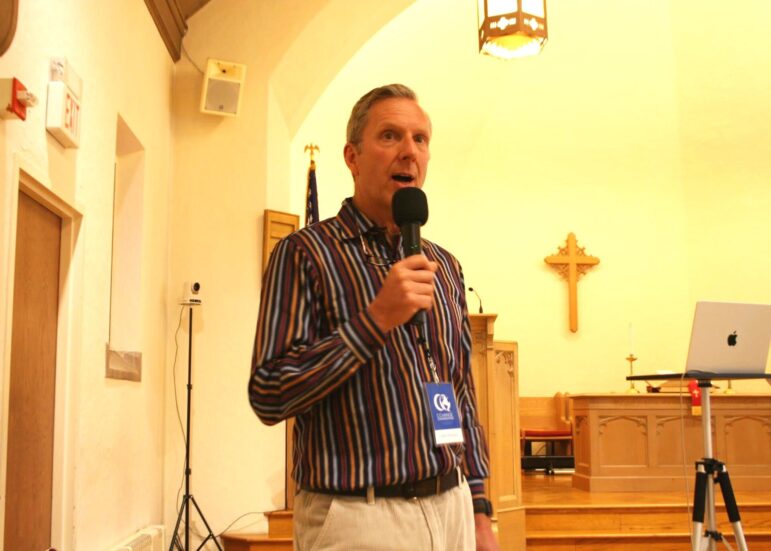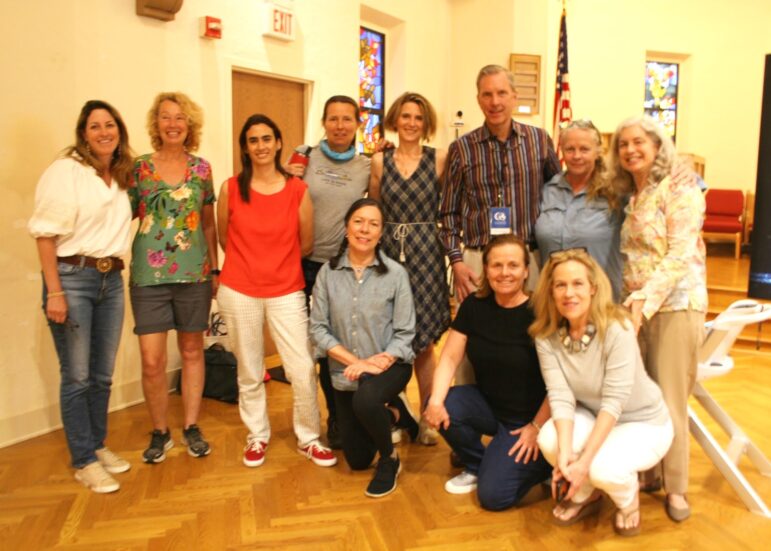By Avery Imp
Dallas Hetherington was the featured speaker at a C-Change Conversation titled “Climate Change 101” at the Second Congregational Church Chapel on Wednesday.
The science-based seminar on the science behind climate change and its various impacts on society, was followed by a question and answer session.

“Whenever we walk into a room like this to talk about climate change, we recognize that there are usually three eight-hundred-pound gorillas in the room with us,” Hetherington said.
“The first one is the fact that everybody knows that the climate has always been changing due to natural causes,” he said. “But this time is different. Scientists say that after a remarkable period of stability over the last ten thousand years, during which our civilization developed and flourished, humans are triggering a period of instability.”
The second and third gorillas are that fossil fuels have undeniably played an important role in society, but now pose a risk to the environment, and the fact that talking about climate change can be divisive.
“Fast forward to today, most Americans get climate change is happening and is human influenced. Where we don’t agree often is on how to evaluate the risk,” Hetherington said.
He said that social scientists typically ask three questions as part of risk assessment:
•How likely is it to happen?
• How dire are the consequences if this risk comes to pass, and are they consequences that we could live with or ones that we really want to avoid?
• How difficult or expensive is it to avoid the risks?
He explained that greenhouse gas emissions are the driving force behind climate change and that the science behind them provides evidence that climate change is currently happening.

“The sun’s energy comes through the atmosphere and hits the planet’s surface. Some of that solar energy is absorbed, which warms us, but much of it ricochets back toward space at a slightly different wavelength. And some of that ricocheting energy is partially captured and re-radiated back towards the earth by the greenhouse gasses, which make up less than one percent of our atmosphere,” Hetherington explained. “These are primarily carbon dioxide, methane, nitrous oxide, and water vapor, and a few others. Without them, we would have a frozen planet. When we create more of them by burning fossil fuels, they simply capture more energy, warming our planet more.”
Before he went into detail on the effects that climate change has on the environment, he asked the audience to consider them through three lenses: jobs and the local economy, health and personal security, and geopolitical security.
First, he described rapidly warming global temperatures, noting that the 10 hottest years on record have all occurred since 2010. He used Hartford, Connecticut as a local example of temperature change, saying that it was expected to feel like Trenton, New Jersey by 2060 and like North Carolina by 2100.
He explained that increased temperatures will harm the economy as productivity and crop yield decrease; damage human health, leading to conditions like heat stroke; and cause refugee crises as people emigrate from their homes when they become uninhabitable due to the high temperatures.
He went on to discuss the impact of climate change on food: “At a three degree centigrade increase, which is close to our current path, we lose our ability to grow food in our critically important producing areas, like in the world’s rice bowl in Asia or the US midwest breadbasket and California, our country’s salad bar and wine cellar.”
He also explained that sea levels are rising due to warmer water temperatures, which cause the oceans to thermally expand, and glacial melting.
“Sea level overall has already risen about eight inches since 1900. Now this increase is accelerated and the relatively small change is already bedeviling communities up and down the US coastlines.”
Hetherington discussed the effects of climate change on human health. Climate change influences pollen levels, causing asthma and allergies to worsen. Vector-borne diseases are also on the rise; citing the CDC, Hetherington asserted that illnesses from insect vectors tripled from 2004 to 2016.
He went on to describe how climate change contributes to increased natural disasters, significant economic loss, decreased biodiversity, and mass migration and international conflict.
He concluded the presentation on a hopeful note by describing strategies that can mitigate the effects of climate change and by encouraging audience members to take action.
Renewable energy is gaining traction and its cost is becoming cheaper than that of fossil fuels.
“In Texas, which has the most wind and battery power and is about to be the biggest solar state when it surpasses California this year, renewables make up about forty percent of its electricity,” he said, “Texas grid operators reported Texas saved eleven billion dollars in wholesale energy costs last year because they have replaced fossil fuel generation with renewables.”
He asserted that with the reduced costs of renewable energy in mind, if humans repurpose dollars currently spent on fossil fuels, “it now appears possible to meet the energy needs of this country and still reach net zero emissions by 2050 with no increase in costs.”
He encouraged individuals to think and talk about climate change often, continue to educate themselves, embrace renewable energy and new technologies, and work to influence policy leaders and companies.
After the presentation, there was a question and answer session during which audience members engaged in a lively dialogue about climate change and the proper course of action.